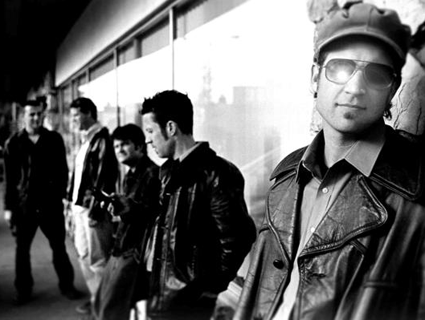
Justin Dillon with Tremolo in 2007.<a href="http://www.myspace.com/tremolomusic/photos/204047">Tremolo</a>/MySpace
You’ve probably never heard of Justin Dillon or his band, Tremolo. After all, until fairly recently, his career was pretty unremarkable: By 2003, Tremolo had developed a following playing the usual tour circuits. They’d even landed tracks on a few films and television shows, including How to Deal, a romantic comedy starring Mandy Moore, and were awaiting an offer from Capitol Records to cut their first album.
“It was a weird phase where Capitol had a hold on us and we were all excited,” Dillon recalls earlier this month as we sit in his sun-basked office in Oakland, California’s iconic Tribune Tower. Wispy haired with hazel eyes, Dillon sports a militaristic look: khaki-green Mao cap, dark-washed jeans, black boots, 10 o’clock shadow.
Not wanting to sit around stressing about the record deal—which never materialized—the band accepted an invitation from a nonprofit to spend a week performing in a remote corner of Eastern Europe. Soon, Tremolo was in a town in Kalmykia, a Russian territory bordering the Black Sea. “Like, way the hell out there,” Dillon says. “It wasn’t hard to impress people because there was nothing to compare us to.”
There, the musicians befriended local kids who spoke of hopeful plans of leaving to work in America. On a hunch, Dillon pressed them for details. It soon became clear that some of these young people were unwittingly setting themselves up to be sold on the slave-labor market. The singer, who had no previous experience in activism, wanted to do something about it, but he didn’t know what. So after returning from Russia, he cold-called a few human-rights activists. “I’m not popular or anything,” he recalls telling one. “But I’ll do anything to help.”
The call led to more calls, culminating over several years into Call + Response, a 2008 musical documentary featuring artists like Natasha Bedingfield, Matisyahu, and Imogen Heap, and interviews with the likes of Madeleine Albright, Cornel West, and Nicholas Kristof. Dillon had never made a film before, but he had friends who had. After his years of recording and producing songs, he says, editing footage came naturally. Call + Response had a limited release in 50 theaters across the US, but it sold out nearly every night. Dillon was hailed as an “accidental filmmaker,” a musician who set out to combat modern slavery.
His leap from performer to activist filmmaker wasn’t necessarily a fluke. In the early ’90s, when U2 played at the Oakland Coliseum to support its seventh album, Achtung Baby, Dillon went to his first concert. The show—which integrated videos, flashing text, and other visual effects intended to satirize a television-addicted and over-stimulated populace—was transformative for Dillon. “At the end of it, I had this feeling in me that I wanted to be a better person,” he says. “I was like, ‘That’s what I want to do for a living.’ That, to me, was religion.”
Nowadays, Dillon runs a nonprofit that raises money for anti-slavery groups around the world, spreading the word through appearances on TV shows and discussion panels. He’s also designed a smart-phone app—100,000 downloads to date, he says—that lets people easily write to the makers of their favorite brands to inquire about their policies on child slavery. The app caught the attention of the State Department’s human-trafficking division, which asked Dillon’s group to design a calculator that can estimate how many slave-hours likely went into supporting an individual’s lifestyle choices. Dubbed the “Slavery Footprint,” it launched earlier this month as a website and mobile app.
For his latest project, a documentary that will air on CNN later this month, Dillon took hip-hop star Common to Haiti to meet children who were farmed out to abusive foster families by parents who couldn’t afford to raise them.
Dillon, now in his early 40s, could never have anticipated such a turn in his career. He was raised in a suburban middle-class family in the Bay Area with “two parents who loved me and not a lot of drama.” He listened to classic rock—Creedence, the Doors, the Stones. At 16, after deciding he wanted to be a musician and buying his first guitar—a cheap Taiwanese model—he took lessons from a local musician who usually showed up high and taught Dillon a thing or two about Jimi Hendrix. “It wasn’t like, ‘Okay, learn your scales, learn this.’ It just immediately got me into wanting to create and perform things. He was responsible for that.”
A year later, Dillon was playing in nightclubs—chaperoned to performances by his parents. He went on to play in a series of bands, traveling to Europe, and touring along with the Blind Boys of Alabama. Eventually, he met Steve Bowman, the Counting Crows’ former drummer. In 2002, they teamed up to form Tremolo.
His activist turn applied to his music as well. In 2005, Tremolo released its debut, Love is the Greatest Revenge, on Flagship Recordings. Sales were weak, so the band decided to revamp its distribution strategy. “Because people are not buying records anyway, let’s give people a reason to buy it and let them choose where the money goes,” Dillon recalls. Tremolo asked its fans to vote on their charities of choice; the winning ones would recieve half of the band’s proceeds from the CD. The band also arranged a sold-out benefit concert for a group called Free the Slaves at San Francisco’s Great American Music Hall. (The night before our interview, incidentally, Tremolo reunited to play a fundraiser for the anti-trafficking group International Justice Mission.)
“How can we make something happen?” asks Dillon, describing the band’s thinking at the time. Off in the distance behind him, a black helicopter buzzes over a mass of Occupy protesters, whose chants periodically interrupt our chat. “Just like what’s happening outside,” he adds.
Reconciling the newborn activist with the aging musician hasn’t always been a smooth sail. “As an artist I have to move toward the stuff that I’m curious about,” Dillon says. “Now that you’re part of this movement, you feel like, ‘Oh, you’re supposed to go to all these meetings in DC.’ But no, I don’t think so. I don’t want to just be occupying the space.”
He also lacks the time these days to play music as much as he’d like. But he’s okay with that, he says. “A lot of musicians say, ‘I’ll make a difference when I’ve accomplished what I want to accomplish,'” he adds. “So for the 99.999 percent of people who don’t accomplish what they’re going to accomplish, does that mean you don’t use what you’ve got?” He adds, “Personally, I’m not going to wait and be like, ‘Okay, I’m famous now and rich now, so now’s the time to make a difference. That’s bullshit.”
Click here for more music features from Mother Jones.














